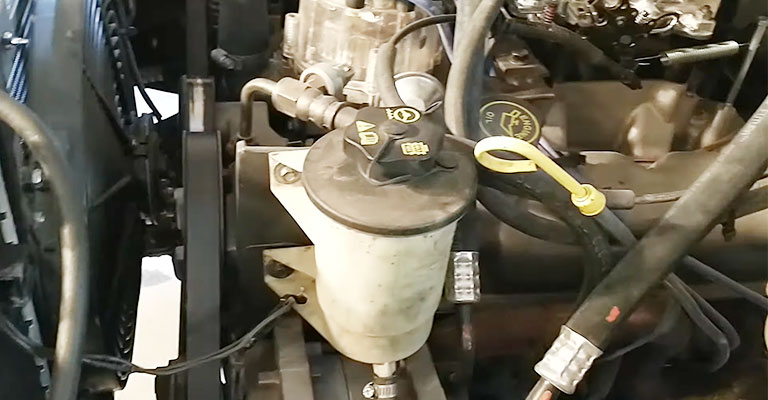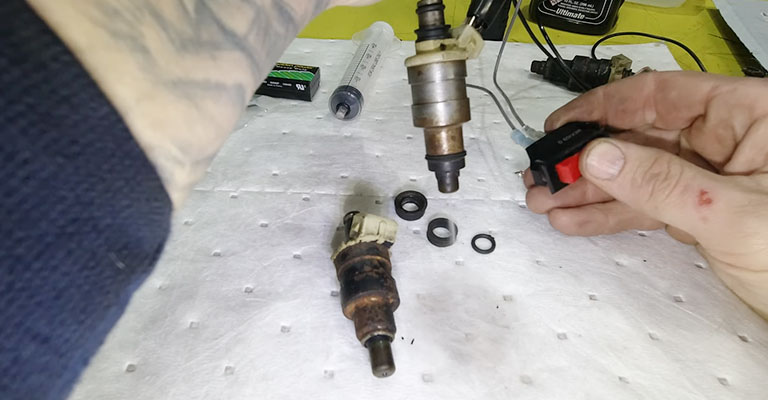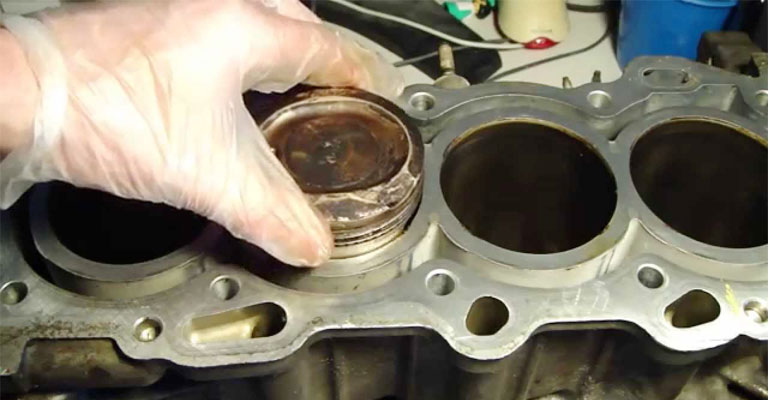When you have logged enough years behind the wheel, you are bound to find yourself facing a large number of peculiar issues. While you might not initially recognize the cause of these puzzling problems, you will indeed know when something is not right.
For example, when your oil does not smell like oil, you might find yourself asking why your oil smell like gas.
In most cases, the reason behind such a smell is that you are driving really short distances, not allowing your engine to become hot. It can also be for a rich air-to-fuel mixture. There are other reasons as well.
But how serious is the problem, and how should you take action? Well, if you want to know about the topic, you should stick to the end of this discussion!
What Makes Oil Smell Like Gas?
So, there are many reasons the oil might smell like gas. Having a proper idea of the causes can let you know the severity of the issue. Therefore, let us not waste more of your time and discuss them, shall we?
You Are Only Driving Short Distances

The gas in your car is always running down into the oil pan. It is true for most car engines. When the oil temperatures get relatively high, the gas will come out in the form of vapor from the engine oil.
However, if you drive for short distances, the engine oil will not get the chance to reach that temperature. As a result, the gasoline will not vaporize and settle down on the oil pan for a while.
Now, if the oil pan is full of gas that did not get the chance to vaporize, you need to replace the filter and the engine oil. Also, if you generally drive for short distances, changing the engine oil more frequently is a good idea.
Air to Fuel Mixture Is Not Right

Another reason why the oil smells like gas is that the fuel mixture is way too rich. When this is the case, the combustion chamber will fail to ignite all of the fuel. That will eventually make the fuel get down into the oil pan through the piston rings.
But how does the air-to-fuel mixture become too rich? It can be due to problems with the sensors. Other problems might also initiate such issues. And the best way to address and diagnose the problems would be to use an OBD2 scanner.
Check all of the trouble codes and see if the codes indicate anything about the troubleshooting process or not. If that fails, rely on your trusty repair shop.
Misfires

A misfire will happen when the air-to-fuel mixture is not getting appropriately ignited. Misfires will disturb the natural combustion cycle. And when the air-to-fuel mix is not correctly ignited, the gas can wash down the cylinder walls. That will cause the compression to be lower than usual.
When the compression is lower than the standard rate, there will be more blow-by on the piston rings. That will eventually make the gas pour through the rings and settle in the oil pan. This will result in the gas mixing with the oil, which will make the oil smell like gas.
So, if you find that the air-to-fuel is not getting properly ignited, you need to get the vehicle checked by a professional.
Faulty Fuel Injectors

The fuel-injected models will have a range of small injection devices that will provide the engine with the fuel required. These devices will rely on a solenoid for the operation. And the car’s computer will precisely control it to provide the engine with the right amount of fuel.
However, solenoids are mechanical. And mechanical parts can easily malfunction. When they do, the computer will not be capable of providing the cylinders with the right amount of fuel. Also, when the solenoid is not working optimally, it will get stuck in the open position.
Once the solenoid is stuck, the gasoline will easily make its way inside and mix with the oil. And that will eventually make your oil smell like gas.
Faulty Settings or Carburetor
The vehicles with carburetors are different than the others. For those, the diaphragm will handle the entire fuel mechanism. And the gas pedal will mainly control the mechanism. Again, all of these are mechanical. So, the butterfly valve that controls the airflow can eventually get stuck due to malfunctions.
That will let the gas get into the oil. And eventually, the oil that is on the car will smell like gas. Also, just like the fuel-injected models, the excessive gasoline will eventually go down the oil pan. Afterward, it will mix with the oil.
Bad Piston Rings

More fuel will run through the combustion chamber and finally into the oil pan when the piston rings are bad. Now, the bad news is that this problem is not easy to repair. You need to take the whole engine apart and replace the rings with new ones.
That said, the good news is that this problem is not as common as the others. However, even if you suspect that the piston rings are the reason why your oil smell like gas, we recommend checking other parts before taking the engine apart.
Alongside that, you can carry out a piston ring check. For that, you would need to perform a leak-down or compression test.
The issue with the Ignition System
The ignition system of the engine will host a large number of parts. All of them work together and help to ignite the fuel. Then, they will deliver the ignited fuel to the cylinders of the engine. However, if any of the components fail, the fuel will be left unburnt in one or multiple cylinders.
In the worst-case scenario, the unburnt oil will wash past the piston rings and mix with the oil on the sump.
Internal Wear on the Engine
In some cases, the culprit behind the oil smelling like gas is the internal wear of the engine. When the walls of the cylinder start to develop wear, the combustion process gets hindered. With the impeding of the combustion, a substantial amount of fuel gets left unburnt.
This unburnt fuel will wash down through the walls of the cylinder and mix with the gas. However, the smell is the only problem that you need to worry about if internal wear is the case for you. This wear can also put the engine at risk.
So, if you suspect that internal wears are the reason why your oil smells like gas, get it addressed by a mechanic as soon as possible!
Very Old Oil
Sometimes, every part of your vehicle might be working correctly, but the oil might still smell like gas. That can happen when you do not change the engine oil frequently.
The thing is, old engine oil tends to achieve a sluggish nature. And this sluggish oil can have a smell that is a lot similar to gas. So, if you have not changed the engine oil for a good while, you should now!
However, if you do not have any idea regarding how to change the engine oil, check the service report manual. It should have proper instructions according to the model of your vehicle. You can also rely on authorized service centers to get the oil changed.
How Safe Is It to Drive Your Vehicle When the Oil Smells Like Gas?
Generally, driving a vehicle with a detectable amount of gas in the engine oil is not advisable at all. If you do so, you will put the integrity of the engine at great risk. The thing is, gas can eventually thin the oil. And when it does, it will reduce the overall viscosity.
Now, when the oil’s viscosity drops, there will be critical wear on the parts. For example, the wear on the bearings of the engine will accelerate. Also, you should note that driving with gasoline-diluted oil can cause instant engine failure. However, that is a pretty rare case.
Nonetheless, even if the harm is not immediate, there still remains a huge risk of damaging the components. The engine might even overheat pretty easily. Therefore, it is a good idea not to drive a vehicle with gas on the oil.
That said, if you do not have any other option but to drive the vehicle, you must consider a couple of things. For example, you should consider changing the oil filter of the engine. Also, you can take the old air filter as a sample. Send it off for inspection to be sure of the gas dilution.
Can the Fuel Economy Take a Hit When You Drive with Diluted Oil?
If the oil is exceptionally diluted, you will lose a significant amount of good fuel. When that happens, your vehicle will have low engine power, and your fuel economy will take a massive hit. This is yet another reason why you should not drive with oil that has gas mixed.
What to Do When the Oil Smells Like Gas?
Before anything else, you should know that the engine manufacturers are well aware of oil dilution. Likewise, the manufacturers of motor oil also know about this issue. That is why they formulate a motor oil that can provide the right amount of protection when the oil gets diluted to a certain degree.
So, if the dilution is not at an extreme rate, you should first consider driving for longer periods. Go on long drives regularly, and make sure that the engine is getting to the optimum temperature to operate properly. That should fix the issue in most cases. The long drives will purify the motor oil.
They will also burn off the excess fuel that might be on the crankcase. However, we recommend changing the oil frequently if you only drive for short distances. Also, when the weather condition is pretty bad, you should avoid cold starting the vehicle. Doing so will kill your engine.
So, in extreme weather conditions, you should change the oil twice as frequently as you regularly do. This is something that most manufacturers recommend.
Final Words
Still asking yourself why does my oil smell like gas? It can be due to a couple of reasons. For example, issues with the air-to-fuel mixture, fuel injector, carburetor, and other vehicle parts can make this problem appear. But you are likely facing this issue because you only take short rides.
Leave a Reply